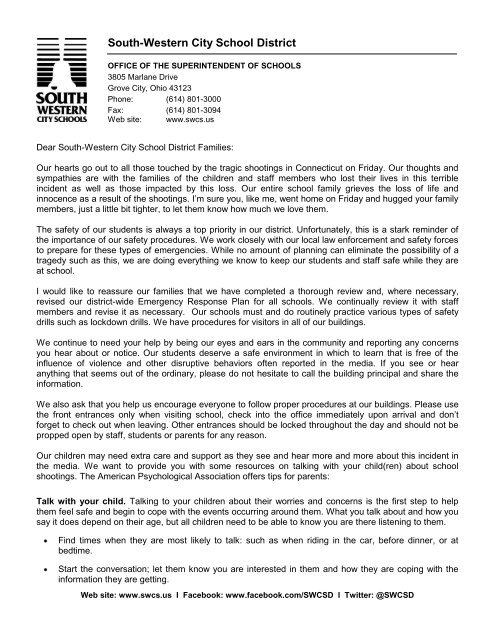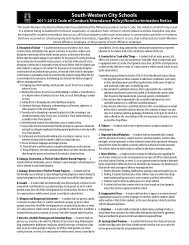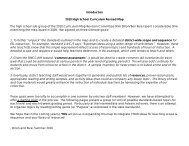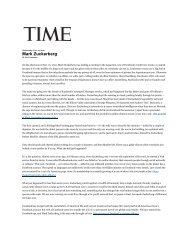a Letter to Parents from Dr. Wise
a Letter to Parents from Dr. Wise
a Letter to Parents from Dr. Wise
Create successful ePaper yourself
Turn your PDF publications into a flip-book with our unique Google optimized e-Paper software.
South-Western City School District<br />
OFFICE OF THE SUPERINTENDENT OF SCHOOLS<br />
3805 Marlane <strong>Dr</strong>ive<br />
Grove City, Ohio 43123<br />
Phone: (614) 801-3000<br />
Fax: (614) 801-3094<br />
Web site: www.swcs.us<br />
Dear South-Western City School District Families:<br />
Our hearts go out <strong>to</strong> all those <strong>to</strong>uched by the tragic shootings in Connecticut on Friday. Our thoughts and<br />
sympathies are with the families of the children and staff members who lost their lives in this terrible<br />
incident as well as those impacted by this loss. Our entire school family grieves the loss of life and<br />
innocence as a result of the shootings. I’m sure you, like me, went home on Friday and hugged your family<br />
members, just a little bit tighter, <strong>to</strong> let them know how much we love them.<br />
The safety of our students is always a <strong>to</strong>p priority in our district. Unfortunately, this is a stark reminder of<br />
the importance of our safety procedures. We work closely with our local law enforcement and safety forces<br />
<strong>to</strong> prepare for these types of emergencies. While no amount of planning can eliminate the possibility of a<br />
tragedy such as this, we are doing everything we know <strong>to</strong> keep our students and staff safe while they are<br />
at school.<br />
I would like <strong>to</strong> reassure our families that we have completed a thorough review and, where necessary,<br />
revised our district-wide Emergency Response Plan for all schools. We continually review it with staff<br />
members and revise it as necessary. Our schools must and do routinely practice various types of safety<br />
drills such as lockdown drills. We have procedures for visi<strong>to</strong>rs in all of our buildings.<br />
We continue <strong>to</strong> need your help by being our eyes and ears in the community and reporting any concerns<br />
you hear about or notice. Our students deserve a safe environment in which <strong>to</strong> learn that is free of the<br />
influence of violence and other disruptive behaviors often reported in the media. If you see or hear<br />
anything that seems out of the ordinary, please do not hesitate <strong>to</strong> call the building principal and share the<br />
information.<br />
We also ask that you help us encourage everyone <strong>to</strong> follow proper procedures at our buildings. Please use<br />
the front entrances only when visiting school, check in<strong>to</strong> the office immediately upon arrival and don’t<br />
forget <strong>to</strong> check out when leaving. Other entrances should be locked throughout the day and should not be<br />
propped open by staff, students or parents for any reason.<br />
Our children may need extra care and support as they see and hear more and more about this incident in<br />
the media. We want <strong>to</strong> provide you with some resources on talking with your child(ren) about school<br />
shootings. The American Psychological Association offers tips for parents:<br />
Talk with your child. Talking <strong>to</strong> your children about their worries and concerns is the first step <strong>to</strong> help<br />
them feel safe and begin <strong>to</strong> cope with the events occurring around them. What you talk about and how you<br />
say it does depend on their age, but all children need <strong>to</strong> be able <strong>to</strong> know you are there listening <strong>to</strong> them.<br />
Find times when they are most likely <strong>to</strong> talk: such as when riding in the car, before dinner, or at<br />
bedtime.<br />
Start the conversation; let them know you are interested in them and how they are coping with the<br />
information they are getting.<br />
Web site: www.swcs.us I Facebook: www.facebook.com/SWCSD I Twitter: @SWCSD
Listen <strong>to</strong> their thoughts and point of view; don't interrupt — allow them <strong>to</strong> express their ideas and<br />
understanding before you respond.<br />
Express your own opinions and ideas without putting down theirs; acknowledge that it is okay <strong>to</strong><br />
disagree.<br />
Remind them you are there for them <strong>to</strong> provide safety, comfort and support. Give them a hug.<br />
Keep home a safe place. Children, regardless of age, often find home <strong>to</strong> be a safe haven when the world<br />
around them becomes overwhelming. During times of crisis, it is important <strong>to</strong> remember that your children<br />
may come home seeking the safe feeling they have being there. Help make it a place where your children<br />
find the solitude or comfort they need. Plan a night where everyone participates in a favorite family activity.<br />
Watch for signs of stress, fear or anxiety. After a traumatic event, it is typical for children (and adults) <strong>to</strong><br />
experience a wide range of emotions, including fearfulness, shock, anger, grief and anxiety. Your<br />
children's behaviors may change because of their response <strong>to</strong> the event. They may experience trouble<br />
sleeping, difficulty with concentrating on school work or changes in appetite. This is normal for everyone<br />
and should begin <strong>to</strong> disappear in a few months. Encourage your children <strong>to</strong> put their feelings in<strong>to</strong> words by<br />
talking about them or journaling. Some children may find it helpful <strong>to</strong> express their feelings through art.<br />
Take "news breaks." Your children may want <strong>to</strong> keep informed by gathering information about the event<br />
<strong>from</strong> the Internet, television or newspapers. It is important <strong>to</strong> limit the amount of time spent watching the<br />
news because constant exposure may actually heighten their anxiety and fears. Also, scheduling some<br />
breaks for yourself is important; allow yourself time <strong>to</strong> engage in activities you enjoy.<br />
Take care of yourself. Take care of yourself so you can take care of your children. Be a model for your<br />
children on how <strong>to</strong> manage traumatic events. Keep regular schedules for activities such as family meals<br />
and exercise <strong>to</strong> help res<strong>to</strong>re a sense of security and normalcy.<br />
These tips and strategies can help you guide your children through the current crisis. Our counselors and<br />
crisis team members are also on hand should you need any additional help.<br />
If you have any questions or concerns, please do not hesitate <strong>to</strong> contact your child’s school or our district<br />
offices.<br />
Sincerely,<br />
<strong>Dr</strong>. Bill <strong>Wise</strong>, Superintendent<br />
Web site: www.swcs.us I Facebook: www.facebook.com/SWCSD I Twitter: @SWCSD
















